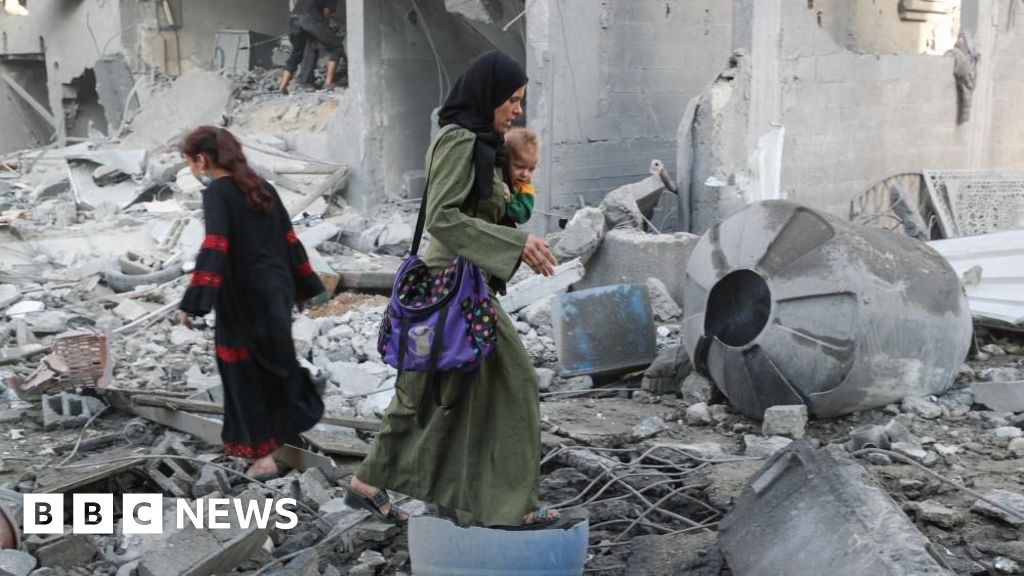Hamas responded to a US ceasefire proposal by saying it is prepared to release 10 living Israeli hostages and 18 dead hostages in exchange for a number of Palestinian prisoners, while requesting some amendments to the plan.
The group repeated its demands for a permanent truce, a complete Israeli withdrawal from Gaza and guarantees for the continuous flow of humanitarian aid. None of these are in the deal on the table.
It was neither an explicit rejection nor a clear acceptance of the US terms, which Washington says Israel has accepted.
Israel has not officially responded to this latest statement from Hamas – but sources quoted in Israeli media said Hamas had in effect rejected the proposal.
Hamas said it had submitted its response to the US draft proposed by Steve Witkoff, US President Donald Trump’s special envoy for the Middle East.
In a statement, Witkoff said: “I received the Hamas response to the United States’ proposal. It is totally unacceptable and only takes us backward. Hamas should accept the framework proposal we put forward as the basis for proximity talks, which we can begin immediately this coming week.
“That is the only way we can close a 60-day ceasefire deal in the coming days.”
Hamas, a proscribed terror group in the US, UK and EU, said it was insisting on a “permanent ceasefire” and “complete withdrawal” of Israeli forces from the Gaza Strip.
The group demanded a sustained flow of aid for Palestinians living in the enclave, and said it would release 10 living hostages and the bodies of 18 dead hostages in exchange for “an agreed upon number” of Palestinian prisoners in Israel.
But Hamas now finds itself in the most complex and difficult position it has faced since the war began.
Under intense pressure from 2.2 million people living in the worst conditions in their history and from the mediators, the movement is unable to accept an American proposal that is, by all accounts, less generous than previous offers it has rejected multiple times, the most recent being in March.
At that time, senior Hamas official and head negotiator Khalil al-Hayya stated unequivocally that the movement would not agree to partial deals that fail to secure a complete and permanent end to the war.
Yet, Hamas also finds itself unable to reject the latest US offer outright, fully aware that Israel is preparing to escalate its ground offensive in Gaza.
The movement lacks the military capacity to prevent or even seriously resist such an assault.
Caught between these two realities, Hamas, in effect, responded to the US proposal not with an answer – but with an entirely new counterproposal.
The full details of the US plan have not been made public and are unconfirmed, but these key points are reportedly included:
- A 60-day pause in fighting
- The release of 28 Israeli hostages – alive and dead – in the first week, and the release of 30 more once a permanent ceasefire is in place
- The release of 1,236 Palestinian prisoners and the remains of 180 dead Palestinians
- The sending of humanitarian aid to Gaza via the UN and other agencies
The terms on offer were the ones Israel could accept – the White House made sure of that by getting Israel’s approval before passing the proposal to Hamas.
It is unlikely that Israeli Prime Minister Benjamin Netanyahu will be willing to negotiate the changes Hamas wants.
He is under pressure to bring the hostages home and has said he is willing to accept a temporary ceasefire to do so.
But the Israeli government has always insisted on the right to return to hostilities, despite Hamas’s core demand for guarantees that the temporary truce be a path to ending the war.
Netanyahu has said the war will end when Hamas “lays down its arms, is no longer in government [and] its leaders are exiled from the Gaza Strip”.
Defence Minister Israel Katz was more blunt this week. “The Hamas murderers will now be forced to choose: accept the terms of the ‘Witkoff Deal’ for the release of the hostages – or be annihilated,” he said.
Earlier on Saturday, the Hamas-run Gaza health ministry said 60 people were killed and another 284 injured in the past 24-hours in Israeli strikes.
That does not include numbers from hospitals located in the North Gaza Strip Governorate because of the difficulty of accessing the area, it adds.
Israel launched a military campaign in Gaza in response to Hamas’s cross-border attack on 7 October 2023, in which about 1,200 people were killed and 251 others were taken hostage.
At least 54,381 people have been killed in Gaza since then, including 4,117 since Israel resumed its offensive on 18 March, according to the Hamas-run health ministry.
Source link
